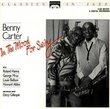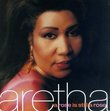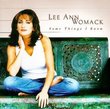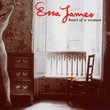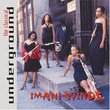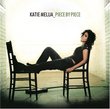| All Artists: Various Artists Title: Carnival Jump Up Members Wishing: 0 Total Copies: 1 Label: Delos Records Release Date: 12/14/1992 Genres: International Music, Pop, Latin Music Styles: Caribbean & Cuba, Calypso, Trinidad Number of Discs: 1 SwapaCD Credits: 1 UPC: 013491401423 |
Search - Various Artists :: Carnival Jump Up
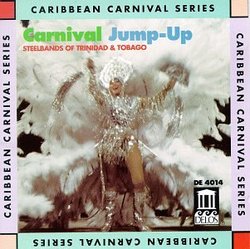 | Various Artists Carnival Jump Up Genres: International Music, Pop, Latin Music
Historians rarely want to give credit to a ghetto man, but "pan," the celebrated Trinidadian steel drum, was invented by a poor inner-city Trinidadian boy growing up during the world-wide Great Depression, Winston "Spree" ... more » ![header=[] body=[This CD is available to be requested as disc only.]](/images/attributes/disc.png?v=a4e11020) ![header=[] body=[This CD is available to be requested with the disc and back insert.]](/images/attributes/disc_back.png?v=a4e11020) ![header=[] body=[This CD is available to be requested with the disc and front insert.]](/images/attributes/disc_front.png?v=a4e11020) ![header=[] body=[This CD is available to be requested with the disc, front and back inserts.]](/images/attributes/disc_front_back.png?v=a4e11020) |
Larger Image |
CD DetailsSynopsis
Amazon.com Historians rarely want to give credit to a ghetto man, but "pan," the celebrated Trinidadian steel drum, was invented by a poor inner-city Trinidadian boy growing up during the world-wide Great Depression, Winston "Spree" Simon. Before there was pan, boys and men banged out rhythms on pieces of bamboo, especially during carnival time. Simon foraged through the city's garbage dumps, coaxing high and low tones from the "sinks" or dents in the hoods of discarded automobiles. Eventually he began knocking out the bottoms from barrels and modifying them by beating the face with stones, so that the "steel pan" could give off a full and nuanced range of melodies. At first the pan was just a noisy instrument fashioned by garbage cans, buckets, biscuit tins, pitch-oil cans, and car hubs. Then carnival was banned during 1942 because of the war, and the steel-pan players went underground, experimenting all the more feverishly. When the ban was lifted in '45 to celebrate victory, the steel bands emerged to goad on revelers to even more feverish celebration. The first tuned pan emerged at that time, and this collection's nine tracks preserve the form's finest exponents. The Solo Harmonites, founded in 1965, weigh in with their prize-winning songs, "Tribute to Glen Miller" (springboarding off "In the Mood) and "Roti and Dhalpourie," a celebration of Trinidad and Tobago cuisine. Silver Stars, who deliver "Lara's Theme" and "Ghost Riders in the Sky," were among the first steel-pan bands to give Calypso interpretations to classical and popular music. Phase II Pan Groove, Carib Tokyo, Amoco Renegades, and Neal and Massy Trinidad All Stars also represent the finest pan exponents from the '70s and '80s in a collection that is a sonically vivid representation of a much larger and completely unique musical dynamic. --Elena Oumano Similarly Requested CDs
|
CD ReviewsGreat Fun!!!! 08/13/1998 (5 out of 5 stars) "Full of fun and energy. Steel Band Of Trinidad's wonderful "Tribute to Glenn Miller" is worth the entire purchase price." Lively groups of pan musicians with terrific sound harry.waldo@lmco.com | Eagan, Minnesota | 11/26/1998 (5 out of 5 stars) "A terrific uplifting CD. Not only are Tribute to Glen Miller and Lara's Theme outstanding on the popular side but Panama and The Pan in me are in my opinion outstanding on the calypso side. Just sit and listen to the subtlties and dynamics of Pan in Me. Super job by Jit Samaroo & Amoco Renegades. I probably have that track just about worn out."
|

 Track Listings (9) - Disc #1
Track Listings (9) - Disc #1